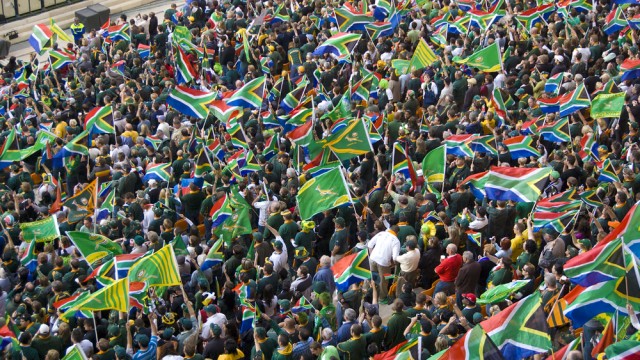As a South African, going to watch soccer is part of my culture. With a vuvuzela in hand and proudly displaying my favourite team’s colours, I try to head to every game played in my home city. The energy, rivalry and passion of the local game are like none other. For anyone visiting South Africa, a soccer game is a must-do. Here are a few things I think you should know before watching a soccer match in South Africa.
Pre-Game
Match Fixtures: The South African soccer season runs throughout the year. You can find all the details of who is playing and when on the South African Premier Soccer League (PSL) website.
Who To Watch: Just as the English Premier League has its Liverpool/Manchester United rivalry, South African PSL has the Kaizer Chiefs/Orlando Pirates rivalry. If you have a chance to only see one game while in South Africa, this is the one. If you can’t see them playing against each other, then try to catch a game involving one or the other. Both teams hail from townships in Johannesburg where loyalty and support is passed down from generation to generation, and fans come out in their thousands no matter where or who they are playing against. Tickets are few and far between, especially when these two soccer giants play each other, so you’ll need to book way in advance — most likely before your trip starts. If you can’t get a ticket, then support the local team in whatever city or town you are visiting — the supporters might be fewer, but will still be loyal.
Tickets: The South African soccer scene is vibrant, entertaining and priced cheaply so that locals can enjoy watching their favourite teams live. Tickets can cost between $4 to $15 depending on the popularity of the teams playing and the location of the seats – behind the goal posts being the cheapest. The cheap seats (or a specific supporters’ block) are usually where you’ll find the die-hard fans. Tickets can be bought online at Computicket.com, or at any Computicket outlet or Shoprite grocery store.
Where To Watch: For the 2010 FIFA World Cup, South Africa built 10 breathtaking stadiums. If you do have the opportunity to, watch a match at one of the following stadiums:
- Cape Town Stadium, Cape Town: Located at the foot of Table Mountain, this stadium is not only in a gorgeous spot, but is also beautiful to look at. Home to local team Ajax Cape Town, the atmosphere is always electric, no matter how big or small the crowd.
- Soccer City, Johannesburg: With a capacity of 95,000, Soccer City (also known as FNB Stadium) is the largest stadium in Africa. Located in the township of Soweto, this iconic stadium is breathtaking and designed to look like a calabash (squash). For a vibe like no other, head to the stadium when home team Kazier Chiefs are playing.
- Moses Mabhida Stadium, Durban: The coolest thing about this stadium is the design! It was built to reflect the South African flag. It also has a really nice tour.
Match Day
Here are some tips to make match day go smoothly and safely.
Transport: For bigger games use public transport, as most roads around the stadium will be closed to traffic, and parking will be a nightmare. It is a super easy way to get to and from games. Public transport is often free if you have a ticket to the match, and there may be park-and-ride facilities as well – this information is always available to the public on the city’s website. Make a note of where to catch the the bus, train or taxi after the game. Smaller games are easier to drive to, as you can park within walking distance of the stadium. With hundreds of fans heading to the match, be sure to head to the stadium early (at least an hour before kickoff).
Grab a bite to eat before the match: With thousands of people gathered in the stadium and no outside food or beverage allowed inside, there will always be queues at the food stands. To avoid this, follow your nose to a boerewors (sausage on a roll) stands you’ll find outside most stadiums, and tuck into a real South African treat.
Mentally prepare yourself for a high-energy day: Before every match, large crowds of passionate supporters sing and dance all the way to the stadium – from public transport to the fan walk. Then once inside the stadium there’s a constant buzz of vuvuzelas as the crowd gears up for the game. And when the match starts, there’s a LOT more noise, which rises and falls with the fortunes of the team. The atmosphere is always electric and energetic. If you don’t like noise, suffer from claustrophobia, or don’t like being bumped and jostled, this is not the place for you.
Safety: Even though there is always police/security present at stadiums, always watch your personal items. Avoid getting too involved with drunk, passionate fans, as they can become verbally abusive and unruly.
Buy a vuvuzela: An authentic way to support the team and participate in the fun is to buy or bring a vuvuzela. These homegrown noisemakers, which make a distinctive (some say annoying) humming/honking sound, are blown throughout the game – for support or discouragement. At times, the entire stadium can seem to be literally buzzing with noise of a thousand vuvuzelas. These horns, along with flags, jerseys and scarves, can be bought in and around the stadium and cost between $4 and $40.
Enjoy the Match: Once in the stadium there is nothing left to do, but take it all in and enjoy the game!

